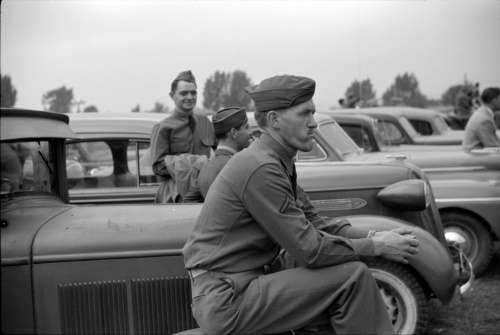Nearly three months before Germany declared war on the United States, Vermont declared war on Germany.
Pearl Harbor, of course, triggered the United States’ entry into World War II. Two days after the Japanese attack on Dec. 7, 1941, the United States declared war on Japan. The assault surprised Hitler as much as anybody, but he declared war on the United States on December 11. The next day, the U.S. reciprocated.
Vermont beat everyone to the punch. On Sept. 16, 1941, Vermont’s Legislature reinterpreted a military order issued by President Roosevelt to establish a state of armed conflict with Germany.
Why War?
Was this another example of Vermont’s iconoclasm? The state always went its own way, having been established as a republic in 1777 before joining the United States. It was the first to ban slavery, the first to provide for a state university – and a Vermonter was the first to photograph a snowflake.
But Vermont wasn’t just trying to be different. Vermont declared war on Germany for a good reason.
In anticipation of hostilities, the United States had reinstituted the draft in 1940. Over the course of the war, 50,000 Vermonters were drafted or enlisted, close to 14 percent of the state’s population. Non-officers earned an average base pay of about $70 a month, which put a financial strain on many young military families.

Soldiers from nearby Fort Ethan Allan at the Champlain Valley Exposition at Essex Junction, Vt. Photo courtesy Library of Congress.
For example, Marjorie Kenney Haselton, a war bride pregnant with a small child, worried frantically about money. From Massachusetts, she wrote to her draftee husband about her finances. She received $80 a month. Her expenses were $20 for rent, $36.50 for milk and groceries, $8.55 for utilities and $6.95 for insurance and laundry. That then left $8 for clothing, medicine, heat in winter months, newspapers, periodicals and amusements.
Why Vermont Declared War
Recognizing many such cases of hardship, the Vermont Legislature wanted to award a bonus to Vermonters called up to serve.
In September 1941, lawmakers got their chance. The Legislature held a special session to bail out the University of Vermont, then facing a financial crisis.
Lawmakers not only appropriated money to bail out the university on September 16, they voted a $10-a-month bonus to the draftees.
But under Vermont’s constitution, they would have had to vote for a new tax in peacetime in order to appropriate the funds. They could vote a bonus, however, during a time of armed conflict.

President Roosevelt signs declaration of war against Germany.
Fortunately for Vermont draftees and their families, President Roosevelt had on Sept. 11, 1941 ordered the U.S. Navy to shoot first if it encountered German warships entering U.S. waters.
Armed Conflict
Vermont lawmakers seized on the chance to redefine ‘armed conflict.’ They called it a state of national emergency in which the president orders armed force to protect lives or property endangered by any hostile foreign power.
In other words, Vermont declared war on Germany.
According to historian Vic Henningsen, the act caught national attention. One newspaper praised the state:
“The rest of the nation, perhaps, may be satisfied by assurances and euphemisms of our national leaders to the effect that we are not at war and have no intention of entering upon a shooting war with the [Germans] or their Axis henchmen. But not so Vermont.
“Vermont sees things clearly and is willing to pay for its vision.”
Image: “VermontMontpelierCapital2709w” by Walter Jeffries. Licensed under CC BY-SA 3.0 via Commons. This story about how Vermont declared war on Germany was updated in 2023.


4 comments
[…] University of Vermont created a Sadie Hawkins-like event called MERP — "Men's Economic Recovery Program.” For a week, […]
[…] the United States entered World War II, Grace Hopper’s husband, brother, cousins and many friends joined the military. She wanted to […]
[…] like a risky venture for the Grossman company turned into a coup when the United States entered World War II. L. Grossman & Co. became the largest lumber company in New […]
[…] the aftermath of Pearl Harbor the U.S. military had to quickly recruit, train and mobilize millions of civilians for war. […]
Comments are closed.